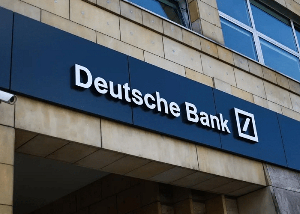Contrary to wide-held views that the International Monetary Fund (IMF) and China are the current leading creditors to Ghana, the evidence provided by the Vice President of IMANI Africa, Bright Simons does not support the said claims.
In an interesting development, the Deutsche Bank of Germany has been identified as Ghana’s leading creditor ahead of the popular bilateral and multilateral creditors such as China, the World Bank, and the International Monetary Fund.
Per the data supplied, the German investment banking company has currently credited US$3.5 billion to Ghana. The funds have been mainly committed to heavy infrastructure projects in the country.
The New Kejetia Market Project and the Western Railway Line are some of the infrastructure projects funded by Deutsche Bank.
“Deutsche Bank’s lending commitment to Ghana is thus roughly double that of China and nearly equivalent to all the money Ghana has borrowed from countries richer than itself,” Bright Simons indicated.
He added that “Deutsche Bank has been busy! From funding the Kejetia market redevelopment (largest such project in West Africa) and various roads to financing trauma hospitals and attempts to fix fast-growing Tamale’s water supply problems, Deutsche Bank’s bet on Ghana was once massive.”
The two multilateral creditors; the World Bank and the IMF come after Deutsche Bank.
World Bank has credited US$1.7 billion to Ghana although it has committed a total of US$3.9 billion while the IMF has also credited US$2.3 billion to the country.
The much-talked-about China has also loaned US$1.7 billion while two leading Eurobond investors; Black Rock and Franklin Templeton currently have US$1 million and US$30 million credits respectively to Ghana although they were higher in previous years.
“BlackRock is believed by some to be Ghana’s largest Eurobond investor. Yet, even at the peak of its holdings in 2020, it carried roughly $630 million. By May 2023, it was reporting just a little over $1 million in holdings of Ghanaian Eurobonds. It appears to have sold most of its holdings over time,” the Vice President of IMANI revealed.
He added that “As of July 2024, Franklin Templeton held more than $30 million of Ghanaian government debt, a steep fall from the $1 billion portfolio it held just a few years ago.”
Although the Deutsche Bank has provided significant funds to finance critical infrastructure projects in the country, experts argue that the inefficiencies in the execution of these projects combined with high-interest cost and increasing debt burden, raise concerns about the sustainability of Ghana’s financial and debt stability.
Business News of Wednesday, 18 September 2024
Source: classfmonline.com













